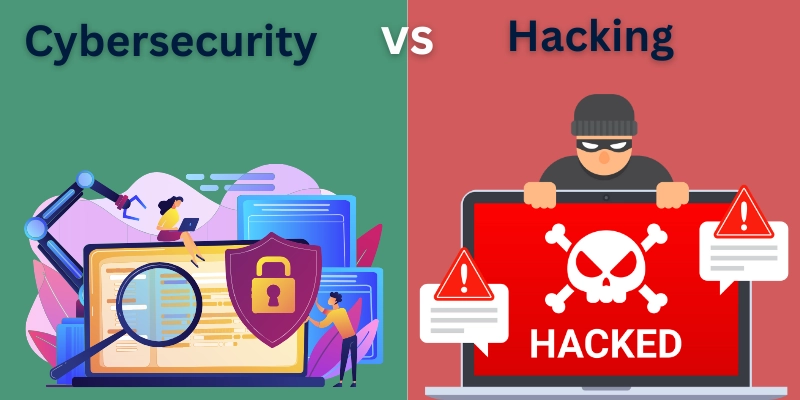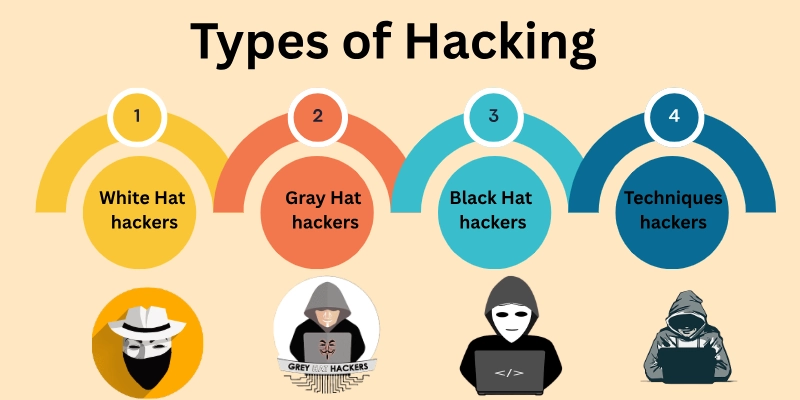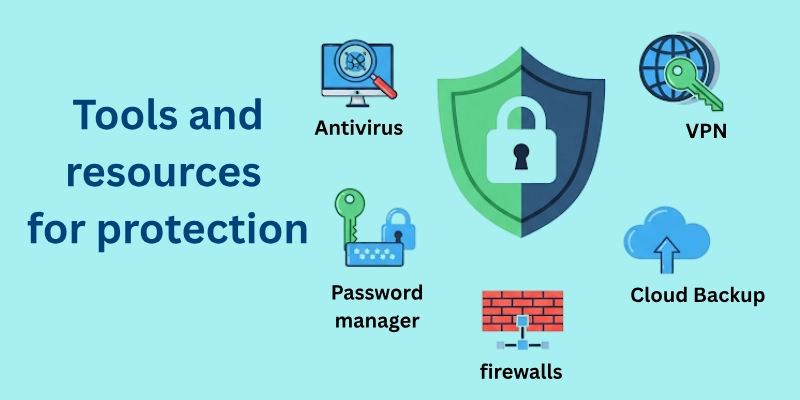Cybersecurity and Hacking: Complete Guide for Beginners
Published: 1 Sep 2025
Every year, millions of people are victims of hackers, losing personal information and money. Have you ever wondered how hackers reach accounts so easily? Many people worry about unsafe sites and online scams, and it can feel heavy. Imagine waking up to find an email or a bank account overnight. The good news is that learning cybersecurity and hacking basics can help you stay safe online.

This guide will show you simple, friendly suggestions to protect your data, avoid hackers, and use the Internet confidently.
What is Cybersecurity?
Cybersecurity is about keeping your computer, mobile phones, and online accounts that are safe from hackers and malicious software. It protects important information such as passwords, images, bank details, and commercial data so no one can steal or abuse them. Just as we use locks, cameras, and guards to protect our homes, cybersecurity acts as a digital lock for our online world. It prevents cyberattacks, viruses, and fraud that try to hurt us or fool us. Today, when almost everything is connected to the Internet, cybersecurity has become very important for both people and businesses. This helps us to use technology with confidence, knowing that our data and privacy are safe.
What is Hacking?
Hacking means getting someone’s computer, phone, or online account without permission. It’s like a stranger in your house without asking. Many hackers do this to steal money, data, or personal information. Some hackers also spread a virus or damage the system to cause problems. But not all hackers are spoiled – some, called moral hackers, use their skills to find problems and make your computer safe. In short, hacking breaks into the digital world, sometimes for loss and sometimes to help.
Cybersecurity vs Hacking
Here is the short comparison table of Cybersecurity and Hacking.
| Cybersecurity | Hacking |
|---|---|
| Keeps data and systems safe 🛡️ | Tries to break into systems 🔓 |
| Legal and ethical ✅ | Often illegal ⚠️ |
| Stops attacks and protects privacy 🔒 | Finds and exploits weaknesses 🕵️♂️ |
| Uses security tools like antivirus & firewalls 🖥️ | Uses malware, phishing, or exploits 💻 |
| Defensive approach 🛡️ | Offensive approach 🚀 |
Hacking Types
Hacking is when someone receives unauthorized access to a computer or network.
- White Hat Hackers: Ethical Hackers who help improve safety.
- Black hacker hackers: malicious hackers causing computer theft or injury.
- Gray hat hackers: a mixture of moral and immoral functions.
- Techniques: Phishing (fake emails), malware, ransomware (locking files for money).
- Example: A hacker stealing login info vs. an ethical hacker testing a website’s security.

Top Cyber Threats You Should Know
Cyber threats are dangers that can harm your devices, steal your information, or compromise your privacy. Understanding these threats helps you take simple steps to protect yourself online.
1. Viruses and Malware
Viruses and malware are harmful programs that can damage your computer or steal your personal information. They can slow down your device, delete important files, or secretly send your data to hackers. Examples include spyware, trojans, and worms. Using trusted antivirus software and avoiding downloads from unknown websites can help keep your devices safe.
2 . Phishing Scams
Phishing scams are fake emails, messages, or websites designed to trick you into sharing sensitive information like passwords or credit card numbers. Hackers often pretend to be banks, companies, or even friends to gain your trust. Always check the sender’s email carefully and never click on suspicious links or attachments.
3. Ransomware
Ransomware is a type of malware that locks your files or computer until you pay a ransom, often in cryptocurrency. Hackers encrypt your data, making it inaccessible, and demand payment to release it. Regularly backing up your important files can protect you from losing valuable information.
4. Data Breaches and Identity Theft
Data breaches happen when hackers get into accounts without permission. They can steal passwords, credit card info, or private documents. Using strong passwords, turning on two-step verification, and checking your accounts often can help you stay safe.
How hackers access
Hackers use different methods to break into computers, accounts, and networks. Understanding how hackers work helps you protect yourself.
1. Social technique
Hackers started providing personal information to people.
- Hackers can pretend to be a bank, company, or friend.
- They try to get the password, credit card number, or personal information.
- Always check who is asking for your information.
2. Software weakens utilization
Hackers utilize weak or old software.
- Not updating the app or program creates security intervals.
- Hackers use these intervals to reach your device.
- Keep your apps and devices updated to block these attacks.
3. Spyware or ransomware
Malicious programs can steal or lock your data.
- Spyware collects secret information without departure.
- Ransomware locks your files and requires payment to unlock them.
- Regular backup and antivirus software help protect your data.
4. Weak password
Simple passwords make hackers easy to break.
- Use strong, unique passwords for each account.
- Enable two-factor authentication for extra security.
- Avoid using the same password in many accounts.
Following these steps can block most regular hacking techniques and keep your data safe.
Cyber Security Best Practices for Beginners
You don’t need to be an expert to stay safe online. Follow these simple steps:
- Use strong, unique passwords for each account.
- Enable two-factor authentication (2FA) for extra protection.
- Keep software and antivirus programs updated.
- Avoid using public Wi-Fi for sensitive transactions.
- Example: A small company that ensures employee units and customer data.
Tools and resources for protecting your data
Many devices make cybersecurity easier and effective:

- Antivirus programs and firewalls: Block harmful software and suspicious activity.
- Password Manager: Strong passwords are generated and stored safely.
- Secure cloud storage: Backups of Important files to prevent data loss.
- Safety Awareness Training: Educate yourself, your family, or staff about risks.
- Tip: Beginners can start with free tools and upgrade as needed.
Conclusion
It is easy to be safe when you understand basic Cybersecurity and Hacking basics. By using strong passwords, updating software, avoiding suspicious links, and backing up your files, you can protect your personal and business data. Remember that even small steps can make a big change in keeping hackers away. Explore Cybersecurity and Hacking every day to strengthen your online security.
Avoid using weak passwords, ignoring software updates, or clicking on unknown links, as these errors may risk your data.
FAQs: Cybersecurity and Hacking
Here are some important FAQs related to Cybersecurity and Hacking.
Cybersecurity is the practice of protecting computers, networks, and personal information from hackers and online threats. It keeps your passwords, bank accounts, and files safe. Everyone can use basic cybersecurity steps to stay protected.
Hacking is when someone breaks into a computer, network, or account without permission. Hackers can steal data, damage files, or cause online problems. Understanding how hackers work helps you stay safe.
Hackers use social engineering, weak passwords, spyware, ransomware, or outdated software to get into accounts. They may trick you or exploit security gaps in your apps. Learning common hacking techniques can prevent attacks.
Use strong, unique passwords and enable two-factor authentication. Update your software and apps regularly. Avoid clicking on suspicious links or emails.
Phishing is when hackers send fake messages or emails to steal your information. They may pretend to be a bank, company, or friend. Always check the sender and never click unknown links.
Ransomware is a virus that locks your files or computer until you pay money. It can stop you from accessing important files. Regular backups can protect your data from ransomware attacks.
Signs include slow performance, pop-up messages, unknown programs, or unusual account activity. Run antivirus software to check for malware. Avoid downloading unknown files or apps.
Yes! Even simple steps like strong passwords, software updates, and safe browsing can protect beginners. You don’t need to be an expert to stay safe online.
Change your password immediately and enable two-factor authentication. Inform your bank or relevant service if sensitive information was stolen. Run a full antivirus scan on your device.
Knowing cybersecurity and hacking basics helps you avoid online threats and protect personal or business data. It gives you confidence while using the internet safely.

- Be Respectful
- Stay Relevant
- Stay Positive
- True Feedback
- Encourage Discussion
- Avoid Spamming
- No Fake News
- Don't Copy-Paste
- No Personal Attacks

- Be Respectful
- Stay Relevant
- Stay Positive
- True Feedback
- Encourage Discussion
- Avoid Spamming
- No Fake News
- Don't Copy-Paste
- No Personal Attacks





